In this generation, more or less, we are all aware of how important it is for our business to have constant inbound and outbound leads.
The B2B e-commerce market Will reach $20.9 trillion by 2027. A Lead generation tool is one of the best weapons for sharpening the growth of B2B and B2C lead generation.
But ultimately, choosing the proper lead generation for your company can be the biggest obstacle you may face. More than 61 percent of marketers point out that generating leads is the biggest challenge.
With this blog will learn more about B2B and B2C lead generation. Further, learn about lead generation tools, explore the free tools, how you can benefit from them, and also the difference between B2B and B2C. So without further delay, let's get started.
What is a Lead Generation System?
Lead generation is the marketing process for attracting customers or capturing interest in a product or service for developing the sales funnel and in the market to make a purchase.
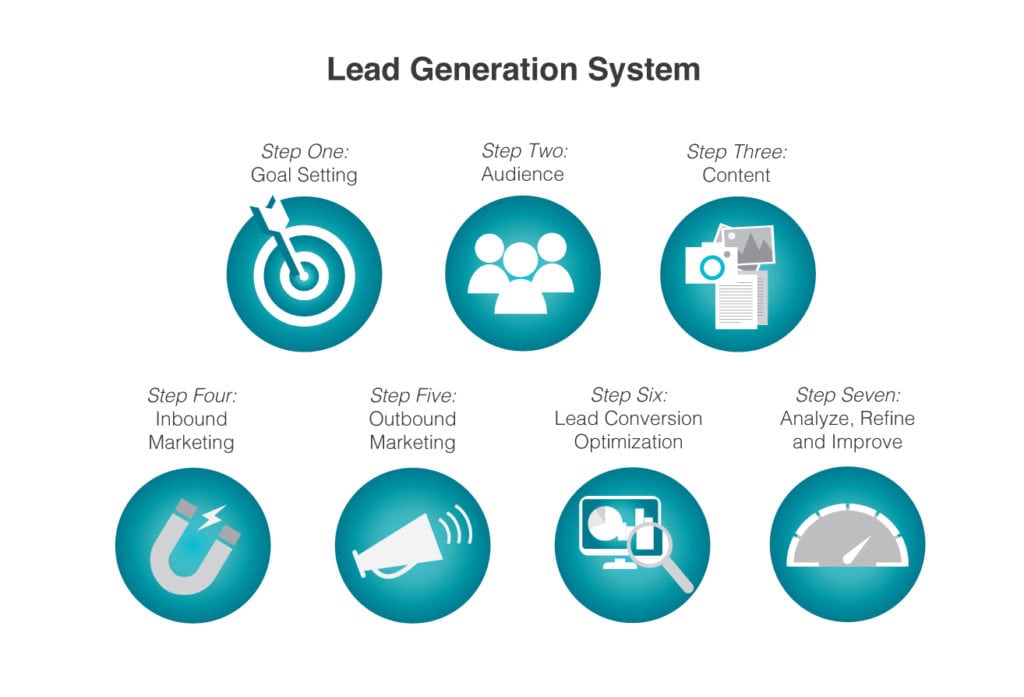
Obtaining leads involves email marketing, social media marketing, content marketing, ads and retargeting, blogs, referral marketing, product trials, etc.
As the business process evolves, marketers must find new ways to combat the noise of other marketing campaigns. Instead of finding customers through email marketing and cold callings, you must reach buyers where they are.
Marketers focus on effectiveness and relationship building. Since lead generation is one of the sales processes, quantity and quality are very important.
What are B2B and B2C Lead Generation?
B2B in lead generation stands for "business to business" company that provides or operates services to other businesses by selling its products.
B2B primarily uses social media to sell its products and goals to personal consumers. B2B proves to be more complex and involves more research.
The buyers have to consult with several departments before buying. For instance, B2B includes electronics, door locks, batteries, tires, office furniture, etc.
B2C in lead generation stands for "business to consumer" company where products move directly from a business to the end consumer who must have purchased them for personal use.
They also sell their products through many businesses without keeping any middle man. B2C has a popularity surge, with 56.9% of retail gains with the collaboration of large companies such as Amazon and eBay.
For instance, B2C shopping can be visiting a doctor, salon, or restaurant, using online apps for shopping, booking cabs, etc.
Differentiate Between B2B and B2C Lead Generation?
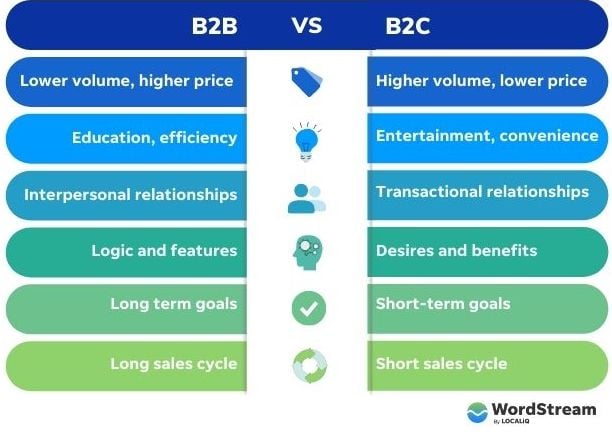
The most crucial difference between B2B and B2C is their customers. B2B provides its devices to the other repurchased businesses and has multiple pricing tiers and order volume discounts.
B2C sells its services or products directly to its customers and a single pricing tier for all customers.
Here are some differences between B2B and B2C:
- In the case of B2B, the buyers research more about the market than the product, which automatically makes them more trustworthy toward the product.
But in B2C, the buyers research more on brand and purchase the product based on existing knowledge.
- Value per lead is higher in B2B, and the number of leads is higher in B2C.
- B2B involves a small number of customers and large unit transactions, whereas B2C includes a large number of customers and small unit transactions.
- B2B makes it complex when it comes to decision-making involving many people. B2C involves mainly the customer and makes it easy to make decisions.
- B2B includes ROI estimation, a decisive factor in its ecosystem. But for B2C, the product look or feel is more crucial.
- The purchase size is small for B2C buyers, and purchases can be of massive amounts.
- B2B sales are located almost everywhere, even in remote places. Still, for B2C, it is only concentrated in the accessible areas and availability of resources to produce products or services.
Why Should you Choose Lead Generation Tools?
Buyers have learned to ignore the messages that are not relevant to them and research on their own what they want to know about specific products or services.
The various critical features of lead generation tools are:
- It integrates with email marketing.
- Marketing analytics.
- Landing page builder.
- Customized coupons.
- Pre-built templates.
- Simple management system
- Campaign management.
- Data import and export.
- Email finder.
- SEO management.
Five Best B2B Free Lead Generation Tools in 2024
The 5 best b2b free lead generation tools are:
Pipedrive
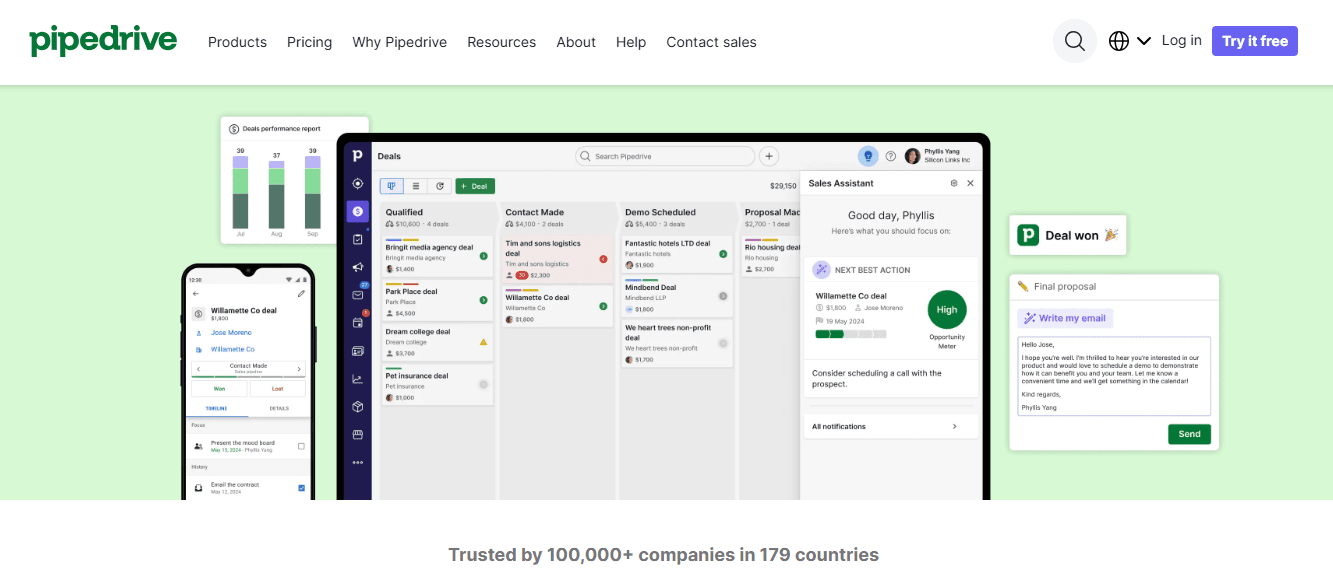
Pipedrive is a B2B lead management tool and a customer relationship management platform as a service company.
It integrates with more than 500 business applications like Zapier, Talkdesk, PandaDoc, Yesware, MailChimp, etc.
Features:
- Customization
- Automation.
- CRM
- Privacy.
- Logging leads.
- Scheduler.
- Email templates.
- Track communication.
Pricing:
- Essential: $14.90, per month per user (billed annually)
- Enterprise: $99.00, per month per user. Only available as the annual plan
- Professional: $49.90, per month per user (billed annually)
- Advanced: $24.90, per month per user (billed annually)
HubSpot
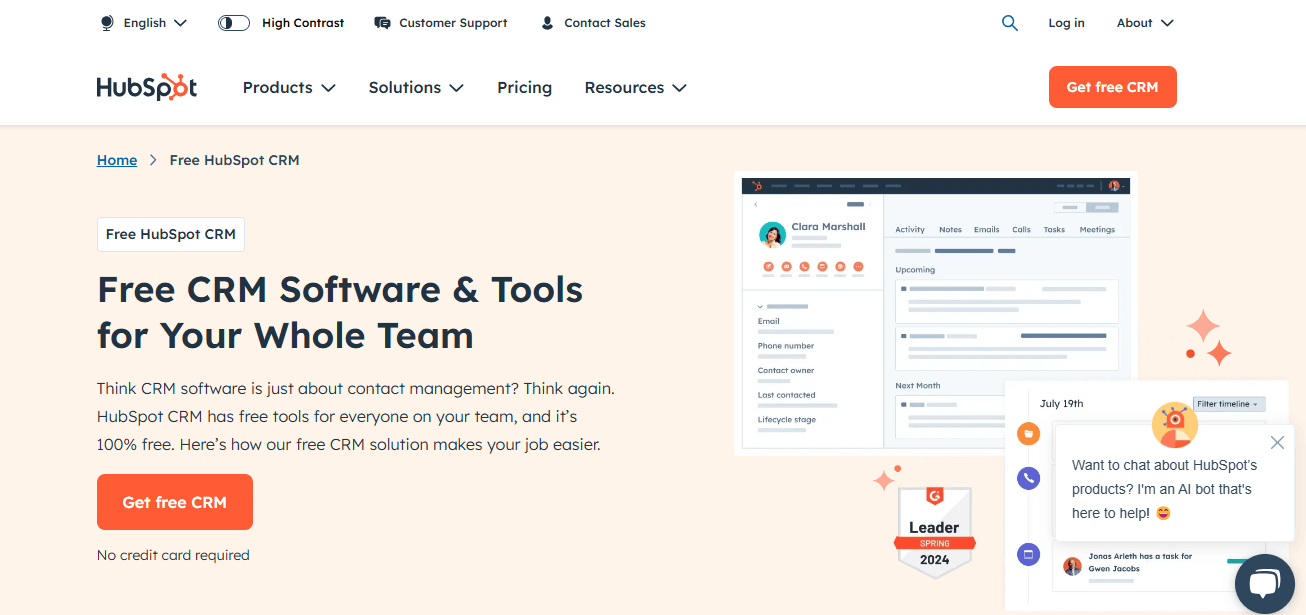
HubSpot is an American developer and a platform for marketing, sales, and service provider. It allows a dashboard of the sales pipeline that provides visibility of sales activities.
It integrates with zoom, Intercom, Twitter, LinkedIn, Salesforce, Zoho, etc.
Features:
- List segmentation
- Workflows
- Reporting dashboards
- Social media management
Pricing:
- Starter: $50/month
- Professional: $250/month
- Enterprise: $100/month
Zendesk Sell
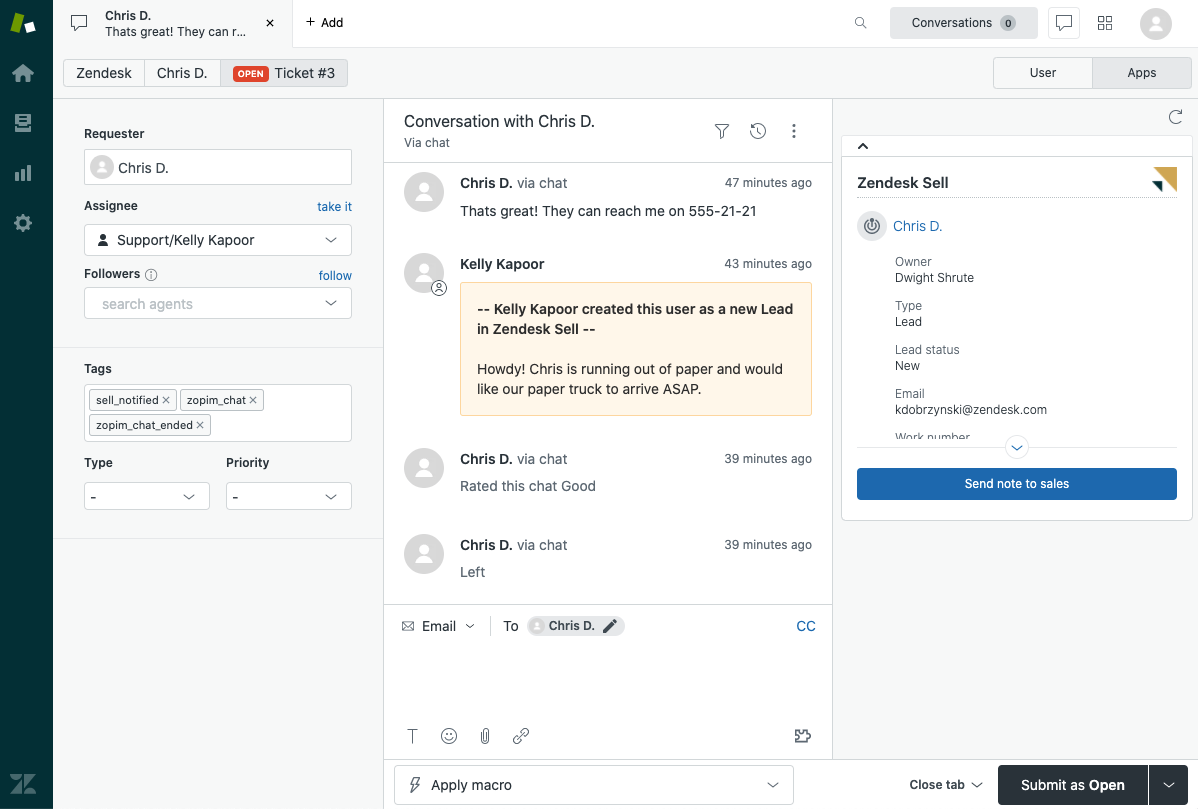
Zendesk is a customer service software and supports ticketing system. It allows customizable tools to build customer service portals.
It supports integration with Amazon, slack, Shopify, Magento, stripe, certify, etc.
Features:
- Reporting
- Forecasting
- Knowledge base
- Case management
- Lead management
- Email marketing.
Pricing:
- Team: $19/ month per user
- Professional: $49/ month per user
- Enterprise: $99/ month per user
- Elite: 199/ month per user
Hunter
Hunter is a cloud-based solution that helps prevent application fraud for any organization dealing with fraudulent applications.
Hunter also allows users to verify email addresses from their domain. It connects with Trello, tribe, Swell, stripe, revue, rewardful, nimble, newsletter, etc.
Features:
- Customer Database
- Email Monitoring
- Marketing Automation
- Email Archiving
- Marketing management
Suggested Reading:
Top 7 free B2B lead generation tools to give your business a boost
Pricing:
- Free: $0/month
- Starter: $49/month
- Growth: $99/month
- Pro: $199/month
- Business: $399/month
Calendly
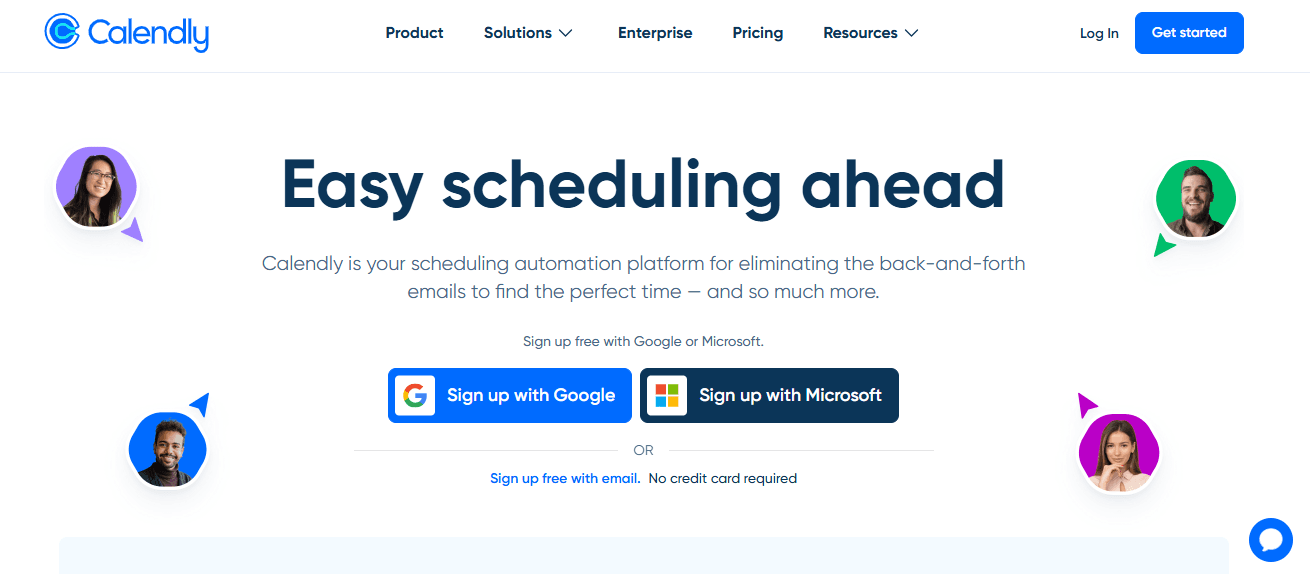
Calendly is an application used for scheduling meetings, events, and appointments.
It efficiently works to eliminate the back-and-forth hassle related to emails so that you can work typically. The integrations of Calendly are Zapier, zoom, PayPal, Stripe, Salesforce, etc.
Features:
- Calendar integration.
- Fully optimized for all devices.
- Simple, elegant, and modern interface.
- Automatic/custom notifications.
- Team scheduling.
- Group events.
Pricing:
- Basic: Always Free
- Essentials: $10 /seat/month
- Professional: $15 /seat/month
- Teams: $20 /seat/month
Five Best B2C Free Lead Generation Tools in 2024
The 5 best b2c free lead generation tools are:
Drift
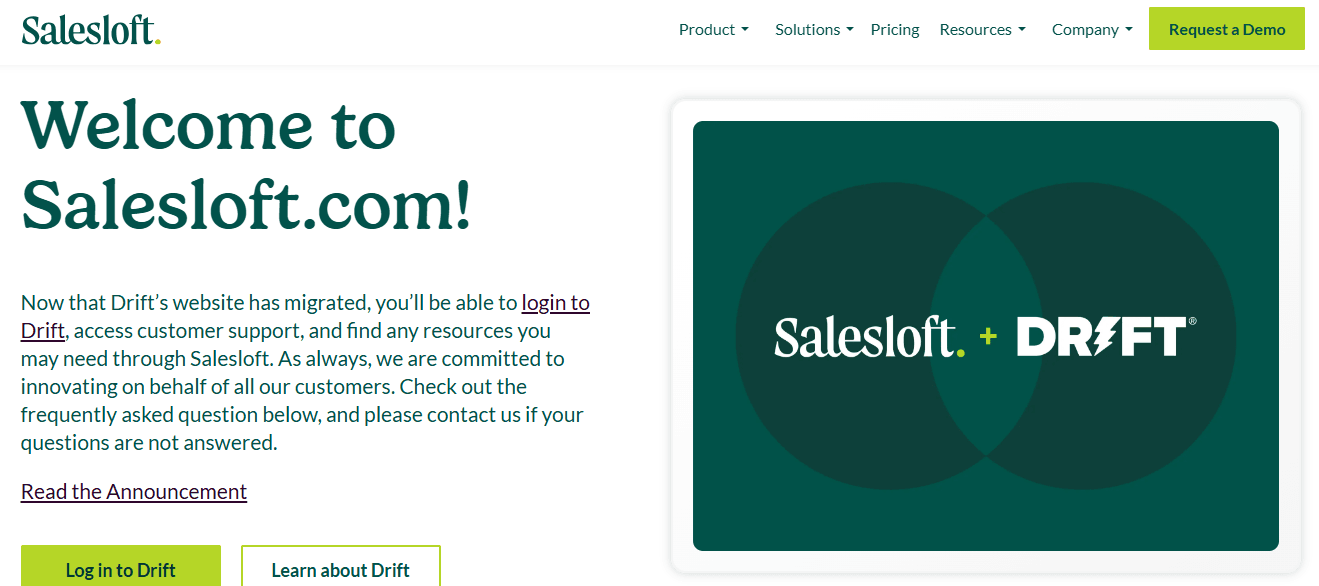
Drift is a messaging app that allows you to chat, email, and video, eliminating the diversion from business buying. It integrates with Clearbit, optimized, sense, Zendesk, Marketo, etc.
Features:
- Auto-Responders
- Automated Scheduling
- Availability Indicator
- Availability Management
- Booking Management
- Calendar Management
- Calendar Sync
- Campaign Management
- Campaign Personalization
- Canned Responses
Pricing:
- Free: Free for live chat
- Premium:$600 per month for ten seats
- Enterprise: for large enterprise business.
- Startup Program: $500 for 10 seats
Nimble
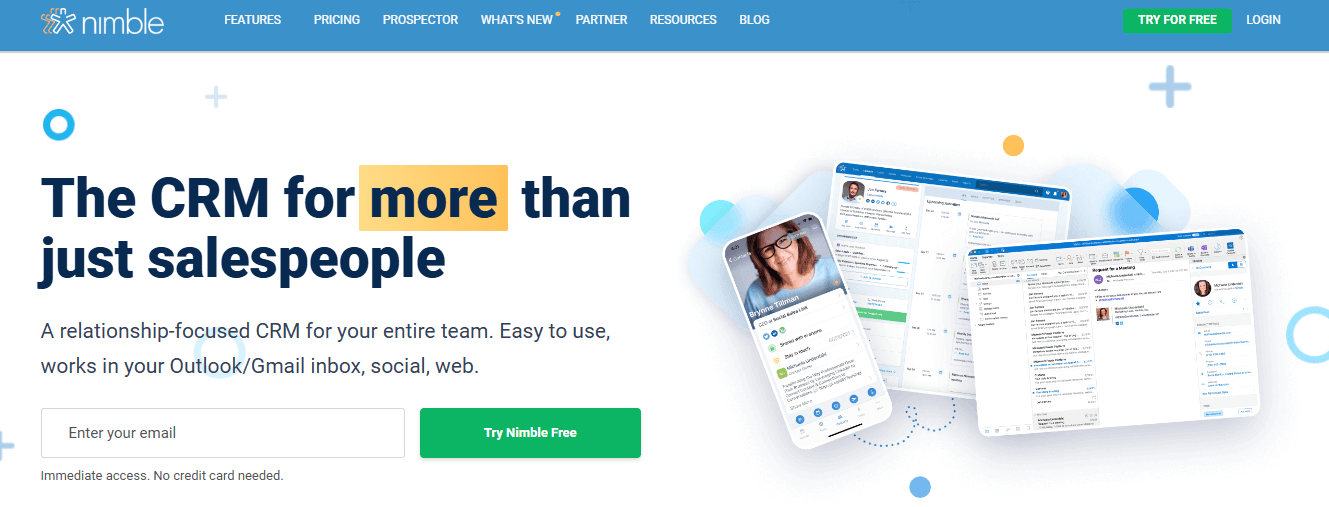
Nimble is a CRM software that amplifies your flow of work and gives you access to activities, contacts, deals, and follow-up reminders from your mobile.
The integrations are Olark, Pipedrive, UserVoice, Zoho CRM, etc.
Features:
- Marketing Automation
- Email Marketing
- Lead Management
- Customer Support
- Knowledge Base
- Mobile & Social
Pricing:
- Starting price: $19.00 per month
- Free trial: Available
- Free version: Not Available
Keap
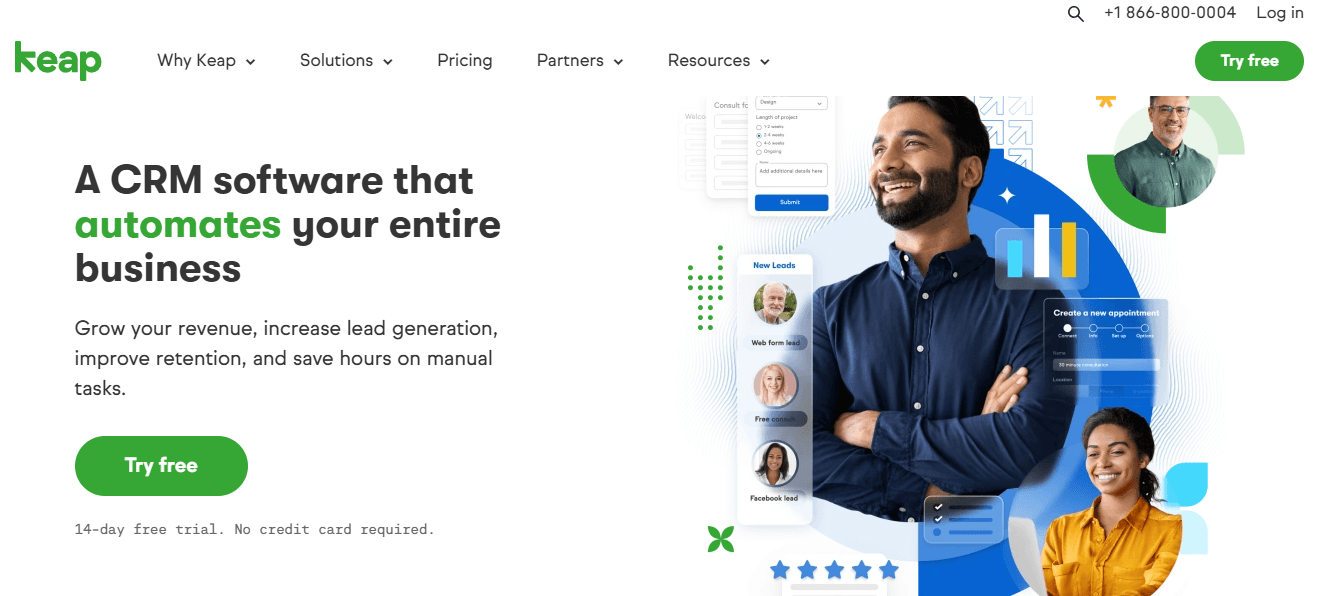
Keap is software to help small businesses and entrepreneurs increase sales, and improve CRM service and marketing automation.
It connects with Facebook, Xero, Shopify, Gravity Forms, Calendly, etc.
Features:
- Dynamic Content
- Mobile-Optimized
- Reporting & Analytics
- Basic Reporting
- Email Marketing
Pricing:
- Free Trial
- Max
- $199.00
- Cloud
- per month
- Pro
- $129.00
- Cloud
- per month
Yieldify
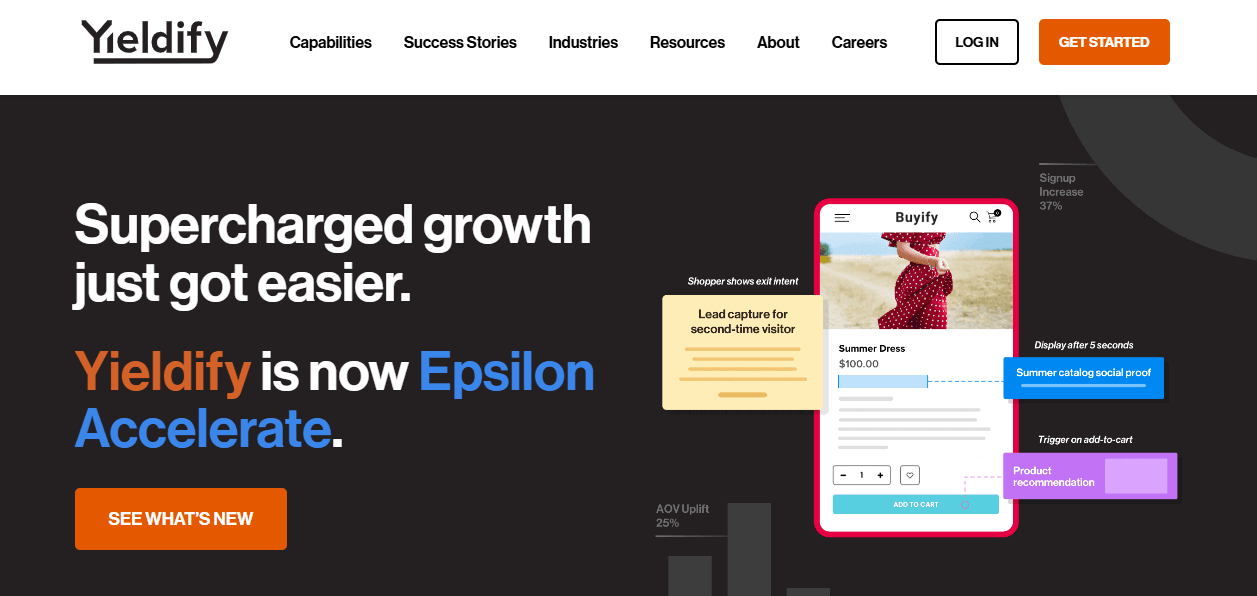
Yieldify is a platform that optimizes and personalizes the entire customer journey. Its integrations are Adobe Analytics, Aircall, attentive, Bluecore, Capsule, etc.
Features:
- Surveys
- Funnel Analysis
- Visual Editor
- Split Testing
- Statistical Relevance Analysis
- Test Scheduling
- Targets audience
Pricing:
- Free trial
- Subscription.
Sumo
Sumo is the perfect app for people who like to do painting, edit photos, 3d modeling, code apps, videos, and many more. It integrates with Mailchimp, google sheets, and Email by Zapier.
Features:
- Contact Collection
- Audience Insights
- Social Sharing
- Metrics
- Entry and Exit Pages
- Sessions
Pricing:
- Just Starting: FREE
- Professional: $24/month
- Small business: $59/month
- E-commerce: $79/month
Summing it Up
In conclusion, you can be at the top of your sales funnel, develop better service, nurture tactics, and generate leads with the top lead-generating software.
For B2B and B2C marketers, generating leads is their main priority. You will get to choose lots of features, pricing options, integrations, and whatnot. Every B2B and B2C lead-generating tool provided here is unique from one another.
You just have to choose one that goes best with your business. Hope this blog has provided you with the best solutions apps to meet your needs.
Check our website for more information on various tools. Collaborate with BotPenguin and see the change.

